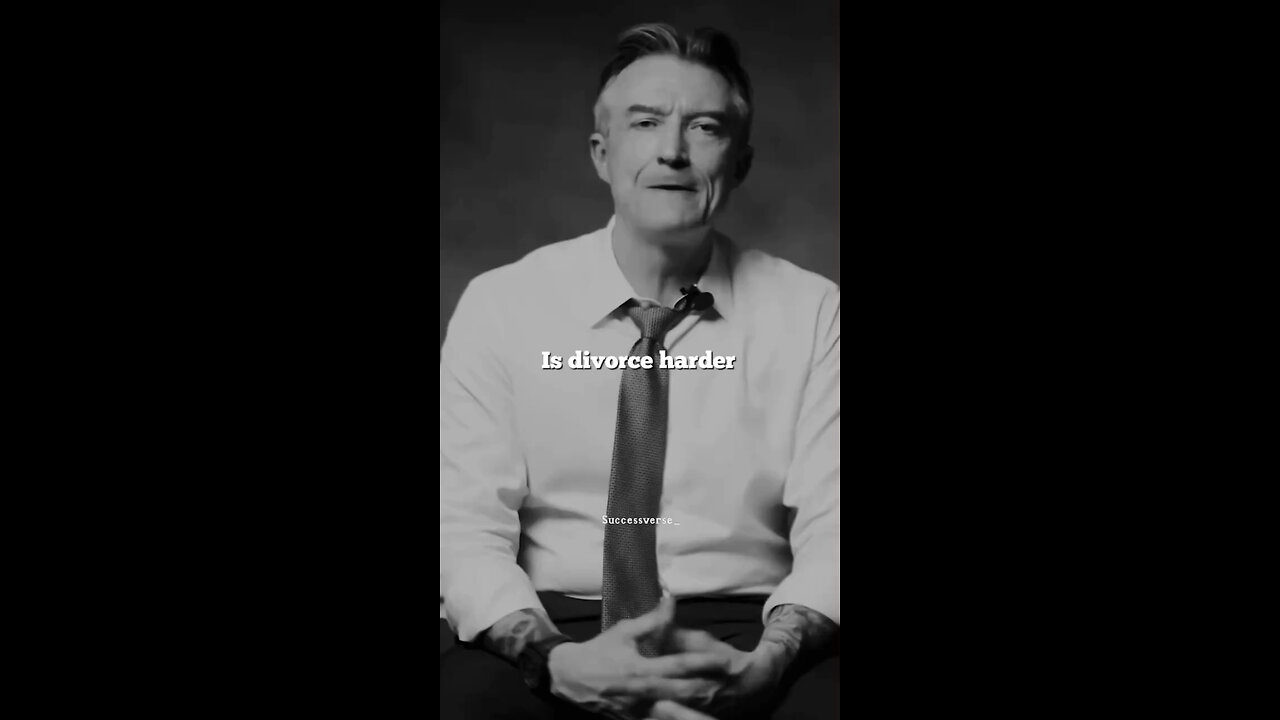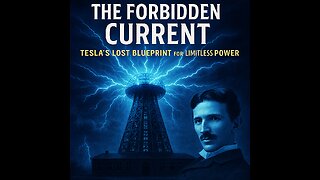Premium Only Content

The Gendered Experience of Divorce: Unpacking the Biases and Realities
Divorce, a deeply personal and often traumatic life event, impacts both men and women in profound but distinct ways. Despite theoretical neutrality in the legal system, societal norms and biases often shape the post-divorce experience, creating unique challenges for each gender. This article explores whether divorce is harder on men or women, highlighting the emotional, financial, and social hurdles they face and the deeply ingrained cultural narratives that perpetuate these struggles.
1. The Emotional Toll: Men vs. Women
For Women: Processing Loss and Rebuilding
Women often bear the brunt of emotional labor, both during the marriage and after its dissolution. While many women may have a stronger support system in the form of friends and family, they also experience unique emotional challenges:
1. Loss of Identity
• Many women tie their sense of identity to their roles as wives and mothers. Divorce can feel like a loss of purpose, leaving them to navigate a new sense of self.
2. Emotional Burnout
• The responsibility of single parenting, often coupled with financial strain, can lead to overwhelming stress and exhaustion.
3. Societal Judgment
• Divorced women may face stigmas, particularly if they have children, as they’re often labeled as having “baggage” in the dating world.
For Men: Isolation and Unprocessed Grief
Men, on the other hand, often experience the emotional toll of divorce differently. Cultural norms discourage men from expressing vulnerability, leading to suppressed emotions:
1. Loss of Purpose
• For men, especially those who were primary breadwinners, divorce can strip them of their role as provider and protector, leading to feelings of inadequacy and loss of purpose.
2. Emotional Isolation
• Men are less likely to have a strong emotional support system, as friendships often lack the depth needed to process trauma. Divorce can amplify loneliness, leaving men struggling to cope alone.
3. Stigma of Vulnerability
• Society often views divorced men as failures if their marriage ends, discouraging them from seeking help or opening up about their struggles.
2. The Financial Divide: Who Bears the Greater Burden?
Women: Unequal Economic Consequences
While women have made significant strides in the workforce, they are still disproportionately affected by financial challenges post-divorce:
1. Single Motherhood
• Women often retain primary custody of children, which, while emotionally rewarding, comes with significant financial strain. Child support rarely covers the full costs of raising children, leaving women to juggle work and parenting.
2. Career Sacrifices
• Many women take career breaks or choose less demanding jobs to prioritize family, leading to reduced earning potential and fewer financial resources after divorce.
3. Long-Term Financial Insecurity
• Without equitable division of assets or sufficient spousal support, divorced women may struggle to rebuild their financial stability, particularly as they age.
Men: Immediate Financial Losses
Men often face immediate and severe financial consequences following divorce:
1. Alimony and Child Support
• Many men feel the financial burden of alimony and child support payments, especially if they perceive the system as unfair or outdated in its expectations of the male breadwinner.
2. Asset Division
• In many cases, men leave the marriage with significantly fewer assets, as they often relinquish property or savings to ensure their children’s stability.
3. Financial Rebuilding
• Post-divorce, men are expected to maintain financial stability while simultaneously rebuilding their lives, which can lead to burnout and frustration.
3. Societal Biases: A Double-Edged Sword
For Women: Sympathy but Stigma
1. Support and Sympathy
• Women are often seen as victims in divorce, especially in cases involving infidelity. This perception can offer emotional support but also reinforces a narrative of dependency.
2. Dating Challenges
• Divorced women with children often struggle to find partners willing to embrace the “instant family” dynamic. They are frequently labeled as having “baggage,” limiting their options in the dating world.
For Men: Suspicion and Alienation
1. Presumption of Guilt
• Society often assumes that the man is at fault in divorce, whether through neglect, infidelity, or failure to meet his spouse’s needs. This bias can alienate men and damage their self-esteem.
2. Custody Challenges
• Despite legal strides toward gender neutrality, men still face significant hurdles in gaining custody of their children. Judges, influenced by traditional gender roles, often favor mothers in custody battles.
4. Post-Divorce Realities: The Road to Recovery
For Women: Rebuilding Independence
1. Empowerment Through Self-Reliance
• Divorce can be a catalyst for women to reclaim their independence, pursue education, or start careers.
2. Strength in Community
• Women often find solace and support in female friendships and community networks, which can aid emotional recovery.
For Men: Rediscovering Purpose
1. Embracing Vulnerability
• Men benefit from seeking emotional support, whether through therapy, friendships, or support groups.
2. Rebuilding Relationships
• While men may face stigma as single fathers, those who prioritize their relationships with their children often find deep emotional fulfillment.
5. A Shared Struggle: Where Can We Improve?
1. Legal Reform
• Family law must continue evolving toward genuine gender neutrality, ensuring fair treatment for both parties in custody and financial arrangements.
2. Societal Attitudes
• Shifting societal norms to remove stigma from both divorced men and women can foster healthier post-divorce dynamics.
3. Support Systems
• Expanding access to counseling, financial education, and community resources can help both men and women navigate the challenges of divorce.
Conclusion: Bridging the Divide
Divorce is a deeply personal journey that brings unique challenges for men and women. While women often face long-term financial and societal stigmas, men struggle with emotional isolation, financial burdens, and custody challenges. Recognizing these differences is crucial to fostering empathy and creating a more equitable society.
Ultimately, the solution lies in addressing societal biases, reforming outdated systems, and ensuring that both men and women have the support they need to heal, grow, and rebuild their lives. Divorce, while painful, can also be an opportunity for transformation and resilience—for both individuals and society as a whole.
-
 4:36
4:36
FragmentsOfTruth
15 days ago🜏 The Forbidden Current — Tesla’s Lost Blueprint for Limitless Power
524 -
 LIVE
LIVE
The Jimmy Dore Show
25 minutes agoDems CAVE On Gov’t Shutdown — Or Do They? Trump GASLIGHTS About Rising Food Prices! w/ Nick Cruse
3,088 watching -
 LIVE
LIVE
Kim Iversen
1 hour agoMAGA = Make Antisemitism Great Again?
4,777 watching -
 1:06:09
1:06:09
Tucker Carlson
5 hours agoUS Government Admits Chemtrails Are Real (It's Worse Than You Think). Dane Wigington Reveals All.
1.15K74 -
 1:51:06
1:51:06
Redacted News
2 hours agoTrump Rolling Out $2,000 STIMULUS Checks in 2025 as the U.S. Economy Flashes RED | Redacted News
120K102 -
 LIVE
LIVE
Dr Disrespect
7 hours ago🔴LIVE - DR DISRESPECT - ARC RAIDERS - THE VENATOR SLAYER
1,417 watching -
 13:26
13:26
Cash Jordan
1 hour agoChicago "RIOTERS" Get CRUSHED... Mayor FREAKS as 'Imported Mob' HAMMERED BY MARINES
13 -
 DVR
DVR
vivafrei
4 hours agoOstrich Farm Update w/ Chris Dacey; Jan. 6 Pipe Bomber IDENTIFIED? w/Kyle Serraphin & MORE!
59.8K37 -
 LIVE
LIVE
The Amber May Show
4 hours agoShutdowns, Shakeups, and 50-Year Mortgages | Sam Anthony
44 watching -
 LIVE
LIVE
StoneMountain64
5 hours agoBattlefield REDSEC $100k tourney tomorrow
59 watching